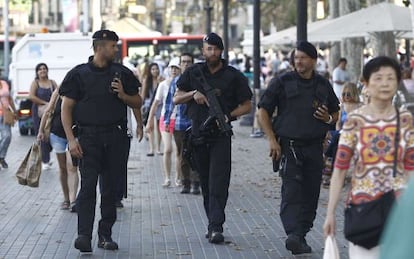Tracking the threat of Spain’s returning jihadists
Danger posed by former Islamic State volunteers greatest in Catalonia, Ceuta and Melilla Twenty-five combatants from Spain have died in Syria and Iraq


At least 25 foreign nationals with Spanish residency permits have died fighting for Islamic State (IS) in Syria and Iraq, according to secret reports compiled by Spain’s security forces and seen by EL PAÍS. Since IS began trying to overthrow the regime of Bashar al-Assad, around 114 mainly Moroccan volunteers have traveled from Spain to Syria. Of the 25 who have returned, 15 are in prison, and the rest, mainly women and children, are under surveillance.
Spanish security forces are saying in a series of reports that they are expecting another terrorist attack here
For the first time since the 2004 Madrid train bombings, Spanish security forces are saying in a series of reports that they are expecting another terrorist attack on home soil. The government has raised its terror alert to level four (high risk) after the attacks in France, Tunisia and Kuwait last week.
Catalonia and the Moroccan exclaves of Ceuta and Melilla are considered the most dangerous areas, and around 200 people are under surveillance there. “Twenty five have come back from Syria and Iraq, but what happens if 2,500 come back, how are we supposed to monitor them? To keep a watch on somebody 24 hours a day requires at least 40 people,” says a senior security official.
Of the 25 combatants killed in action in Syria and Iraq, only six are Spanish nationals, all of them from Ceuta. The rest were Moroccans living in Spain. Three of the dead were killed in suicide attacks, one against a Syrian army barracks, and two others in missions against the Shiite community in Baghdad and southern Iraq that killed more than 1,000 people.
Twenty five have come back from Syria and Iraq, but what happens if 2,500 come back, how are we supposed to monitor them?”
The number of Spanish nationals fighting for IS is much lower than that of French and British volunteers, which have contributed around 1,400 and 500 men and women, respectively, to the group’s ranks. But Spanish security forces say the risk is the same. “We have multiplied the threat level in Catalonia by 15. Barcelona has become a priority target because of its international profile and importance as a tourism destination,” say security sources.
IS encourages volunteers who survive six months of combat to return to their home countries to set up sleeper cells. “These are people who have become experienced killers and are ready to do whatever they are asked. The ones who come back are much more dangerous than the ones we prevent from leaving,” says a security source.
IS and Al Qaeda’s focus on Catalonia is hardly news. Security services have already foiled a plan by a Pakistani cell to attack the Barcelona metro, and in 2007, the United States decided to open a spy center at its Barcelona consulate because it considered Catalonia “the biggest Mediterranean center of jihadism,” according to secret documents seen by this newspaper. “The high levels of immigration, illegal and legal, from North Africa (Morocco, Tunisia and Algeria), as well as from Pakistan and Bangladesh, make this region a magnet for recruiting terrorists.” There are an estimated 75,000 Pakistanis in Catalonia, many of them without residency permits.
In July 2001, Mohammed Atta, the leader of the cell responsible for the 9/11 attacks, traveled to Catalonia where he met Ramzi Binalshibh, a Yemeni he had shared an apartment with in Hamburg, informing him of the date and objectives of the attack that killed 3,000 people. Al Qaeda already had extensive infrastructure in the region. “Reus, Girona, and Torredembarra are some of the most active centers in Europe,” says a member of the Civil Guard.
Spain has arrested more suspected jihadists than any other country in Europe: around 527 since 2004. Last year alone, five cells were broken up, all in Ceuta and Melilla, while several people returning from Syria, Iraq and Mali were arrested.
Last year, investigating judges and public prosecutors multiplied the number of cases involving international terrorism by 15, according to judicial sources. The majority of suspects are foreigners, mostly Moroccans, Algerians and Pakistanis. More and more of them are recruited online, and they are reportedly getting younger.
Spanish police seek Al Qaeda informant
The authorities in Spain are looking for Hani Muhammad Mujahid, aged 38, a former member of Al Qaeda and now an informant for the Yemeni secret services whose warning of the 2007 attack against a group of tourists visiting the Mahram Bilqis temple complex in Yemen that left 10 people dead, among them eight Spaniards, was ignored.
Following the recent publication in EL PAÍS and on Al Jazeera's website of a story that included an interview with Mujahid, public prosecutors have called on the Spanish police to locate him urgently. They want to check his version of events about the attack in Yemen, as well as his links to Al Qaeda in Yemen, and his dealings with that country's secret services during the mandate of former president Ali Abdullah Saleh, whom he accuses of allowing Al Qaeda to organize attacks so as to win US support.
Finding Mujahid and establishing his links to Al Qaeda – he is believed to have trained jihadists in Afghanistan in 1998 – would be the first step toward reopening a judicial investigation that was closed after the Yemeni authorities refused to cooperate.
Mujahid says he was with the terrorists in the desert planning the car bomb and heard their plans to attack the group of Spanish tourists. He called the secret services to warn them, but nothing was done.
Tu suscripción se está usando en otro dispositivo
¿Quieres añadir otro usuario a tu suscripción?
Si continúas leyendo en este dispositivo, no se podrá leer en el otro.
FlechaTu suscripción se está usando en otro dispositivo y solo puedes acceder a EL PAÍS desde un dispositivo a la vez.
Si quieres compartir tu cuenta, cambia tu suscripción a la modalidad Premium, así podrás añadir otro usuario. Cada uno accederá con su propia cuenta de email, lo que os permitirá personalizar vuestra experiencia en EL PAÍS.
En el caso de no saber quién está usando tu cuenta, te recomendamos cambiar tu contraseña aquí.
Si decides continuar compartiendo tu cuenta, este mensaje se mostrará en tu dispositivo y en el de la otra persona que está usando tu cuenta de forma indefinida, afectando a tu experiencia de lectura. Puedes consultar aquí los términos y condiciones de la suscripción digital.








































